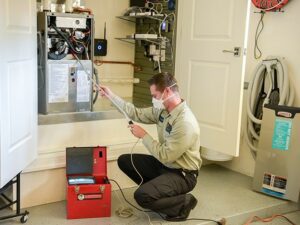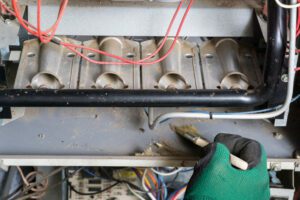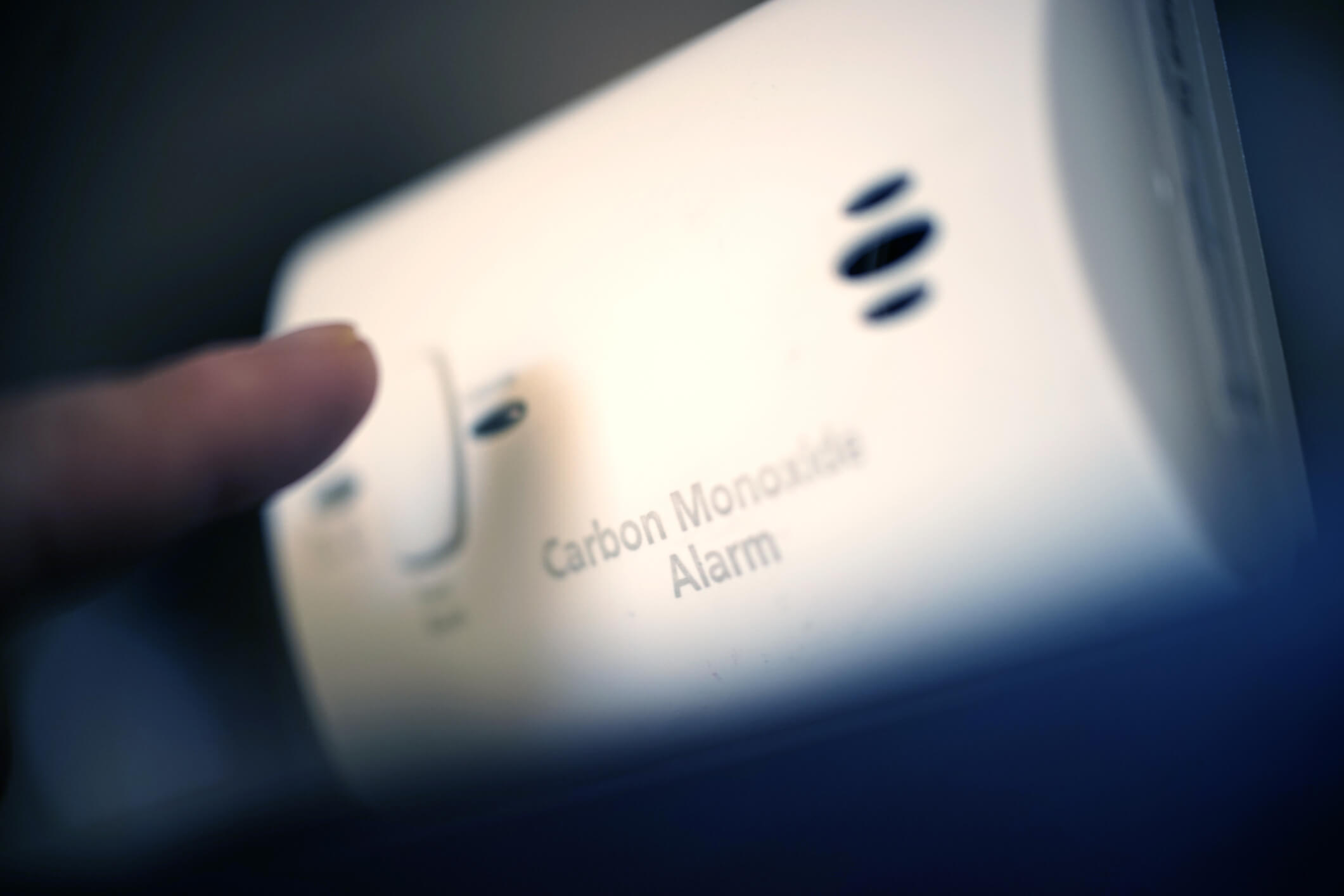As many as 47% of U.S. households rely on natural gas furnaces for heat. While they’re an effective and efficient way to stay warm, they come with some potential dangers. One of the key components of a gas furnace is the heat exchanger, which acts as a barrier between the combustion process and the air you breathe. If the heat exchanger cracks, harmful fumes like carbon monoxide can enter your home and put your family at risk.

What Is a Heat Exchanger, and How Does It Work?
To understand what the heat exchanger does, it helps to learn a few basics about furnace combustion. Your furnace burns natural gas to generate heat, producing combustion fumes. One of your furnace’s most harmful combustion gases is carbon monoxide (CO), an odorless, colorless gas that can cause lethal poisoning.
Now you might wonder, how is keeping this furnace in my house safe? For one, your furnace is a sealed system that vents combustion gases safely outdoors. The next critical piece of the equation is the heat exchanger.
The heat exchanger acts as a barrier between the combustion process and air circulating through your home. As the furnace runs, the burners warm the metal of the heat exchanger. The blower then pushes cold indoor air over the heated metal, warming it before it enters your home. Throughout this process, the heat exchanger keeps harmful fumes contained inside so they never come in contact with the air distributed in your home.
How Can a Cracked Heat Exchanger Lead to Carbon Monoxide Poisoning?
The heat exchanger spends a lot of time heating up and cooling down, causing the metal to expand and contract. Over time, the metal wears out and becomes brittle, making it more susceptible to cracking. When a heat exchanger cracks, harmful combustion products like carbon monoxide escape and mix with the air circulating throughout your home. Since CO is odorless and colorless, it can go undetected and put your household at serious risk of poisoning.
Common Signs of a Cracked Heat Exchanger
Knowing the warning signs of a cracked heat exchanger helps protect your family against CO exposure. If you notice any of the following, immediately contact a professional:
- There’s no airflow: When your heat exchanger cracks, safety features often cause your furnace to shut off and stop blowing air to prevent the spread of carbon monoxide.
- The flame color is different: When a cracked heat exchanger allows oxygen to enter the chamber, the flame of your gas furnace turns from blue to yellow.
- You hear loud noises: Banging, whistling, or scraping sounds from your furnace may indicate a crack in the heat exchanger.
- Your carbon monoxide alarm is going off: If your heat exchanger cracks and allows carbon monoxide to enter your home, your CO detector may sound an alarm. If this happens, immediately evacuate and call emergency services.
- There’s soot buildup: If you see a buildup of black soot inside your furnace, a broken heat exchanger could be causing incomplete combustion.
- You notice an unpleasant odor: When your heat exchanger cracks, you might notice a strong, chemical-like smell coming from your furnace.

The Dangers of Carbon Monoxide Leaks in Your Home
The dangers of a faulty heat exchanger stretch far beyond improper furnace function. They also pose a serious health risk, allowing carbon monoxide to leak into your home. Low levels of carbon monoxide exposure can cause headaches, shortness of breath, and nausea, while high levels can be fatal within minutes. If you notice any symptoms of carbon monoxide poisoning, immediately evacuate your home and call 911.
What to Do If You Suspect a Heat Exchanger Crack
If you suspect HVAC heat exchanger failure, act fast. Immediately turn off your furnace and gas valve to stop combustion and keep potential leaks from getting worse. Check your carbon monoxide detector to make sure it’s working and showing a reading of zero. If it’s going off, immediately evacuate everyone in the household and call emergency services.
Once your home is safe to enter, contact a reputable HVAC company like Monarch Home Services to schedule a professional inspection. A certified technician will evaluate your furnace and check for heat exchanger damage. If they discover a crack, they’ll recommend the best solution to restore your home heating and keep your family safe.
Can a Cracked Heat Exchanger Be Repaired?
Repairing a cracked heat exchanger is often not a safe solution. While a technician can sometimes fix minor cracks with welding or epoxy, this isn’t a long-term solution. Because of the risk to your health and safety, you’ll typically need to replace the entire heat exchanger or the furnace itself. A trusted HVAC contractor can help determine whether a heat exchanger repair or replacement is best for your home based on the severity of the damage, the furnace condition, and your budget.
Preventative Maintenance to Avoid Carbon Monoxide Poisoning
With routine maintenance and a few safety precautions, you can help protect your family against CO poisoning. To prevent carbon monoxide leaks in your furnace, take the following steps:
- Install a carbon monoxide detector and regularly test it for proper function.
- Change your furnace air filter once every three months to reduce stress on the heat exchanger.
- Schedule annual furnace inspections with a trusted HVAC company near you.
- Keep vents and flues clear of dirt and debris.
- Contact a professional for inspection at the first sign of furnace malfunction.
Why Professional Furnace Inspections Are Essential
Professional furnace inspections keep your household safe and warm by catching potential issues early on. During an inspection, a skilled HVAC technician inspects, cleans, and services your system while checking for signs of wear, leaks, or damage in major components like the heat exchanger. Catching these problems early allows for repairs or replacement before a leak occurs, helping prevent carbon monoxide exposure and unexpected breakdowns.
Schedule a Furnace Inspection with Monarch Today!
Don’t let a heat exchanger crack put your family at risk. Contact the team at Monarch Home Services today to schedule a professional furnace inspection in Bakersfield or surrounding areas. Our experts will assess your furnace, check for damage, and address any potential issues before they become a serious safety hazard.
Call us or book online to schedule your furnace inspection today! We also offer heating repairs, installations, and replacements that keep your home warm and cozy all winter.


